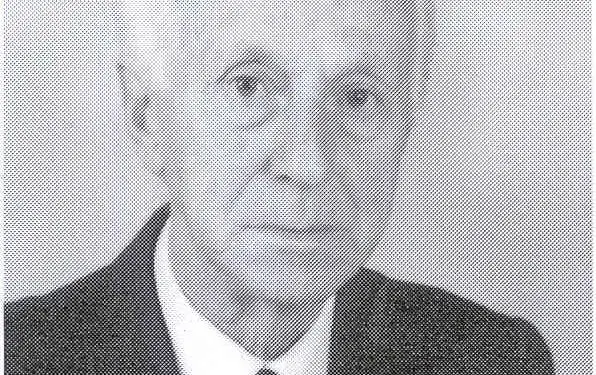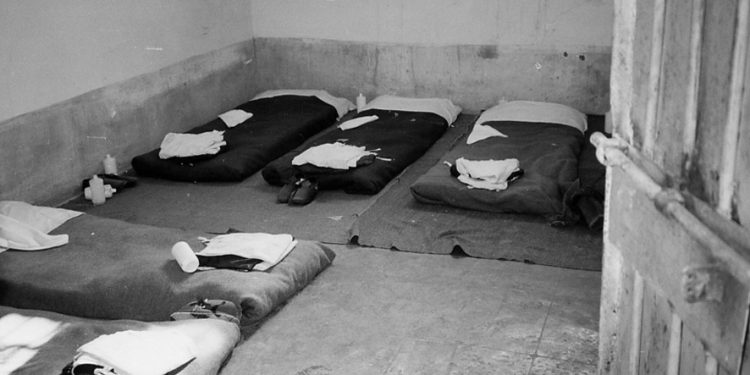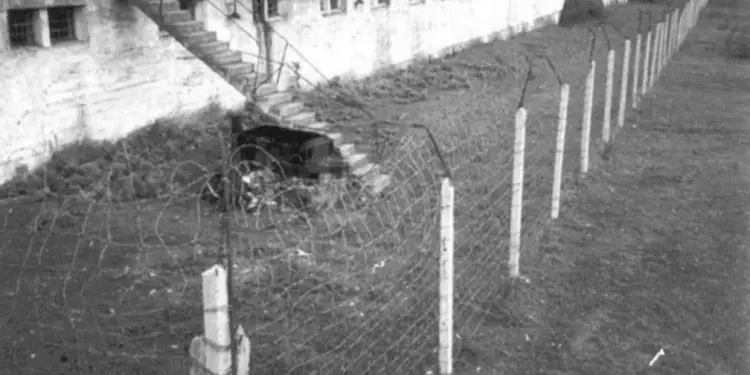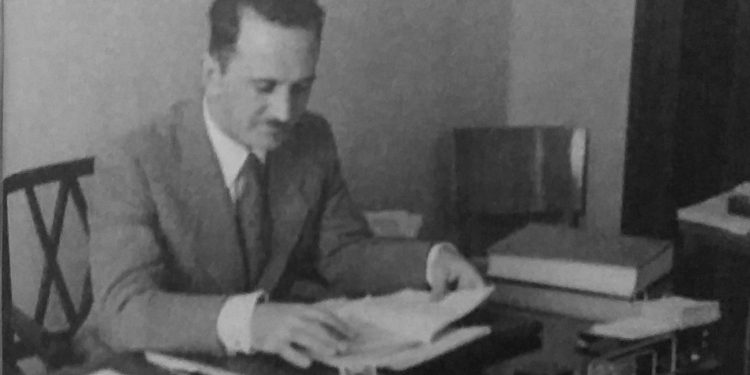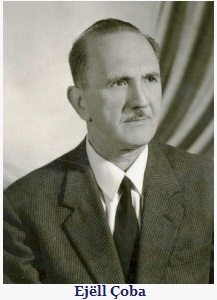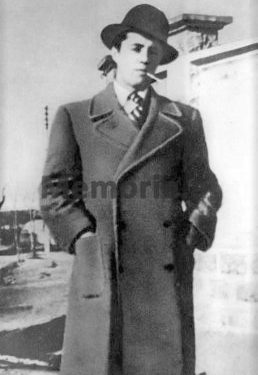From Uran Kalakulla
Memorie.al / Uran Rasim Kalakulla were born in Tirana in 1929, while the origin of their family is from Libohova in Gjirokastra. He completed his pedagogical studies in his native country and worked as a teacher of Albanian language and literature, in Berat and in the villages around Tirana. In 1960, he was arrested in a group for organizing a social-democratic party and was sentenced to death (by firing squad). After two months, his life was spared and he was sentenced to 25 years in prison, of which he served 21 years, mainly in Burrel. After prison, he was interned for 5 years in the villages of Kavaja. In 1991, he became the initiator of the creation of the National Society of Formerly Persecuted and Political Prisoners of Albania. In recent years, he has dedicated himself to writing and has published several books, including “Vergje ne pranga”, “Albanianism and its European trend”, “Arshi Pipa – the man and his works”, “21 years of communist prison”. Uran Kalakulla passed away in 2001. The text that we are publishing below is taken from the book “21 Years of Communist Prison”.
PORTRAITS OF PRISONERS
Goni Treska from Korça
I met Goni Treska in the prison camp of Elbasan, and then we got closer to the prison of Burrel, when shortly after I was taken there, they brought a group of old men from that prison camp, who were no longer able to work, exactly in room No. 1 where I was then. Gon was assigned a seat there, luckily, right next to me.
At that time, Goni had passed his sixty-five years, but, although he was in prison for the third time, since ’45, he was still keeping well and his mind was clear. Only, of course, the signs of fatigue and premature old age were clearly visible. His hair had fallen out and only the side of his head was left with a few rare hairs, red, like copper wires, and around his blue eyes were visible the signs of the great hardships he had taken.
Goni was from one of the most famous families in Korça. The parents had only that son and as an only child, they had raised him with all the good things. His father had been a merchant, and he had taken his son to graduate from the Commercial School in Corfu.
There, Goni had learned not only finance, but also Greek and French as a second language. But neither trade nor any other craft or culture had strongly attached to Gon’s soul that he had preferred to learn the culture and philosophy of practical life. Thus, in a way, he had become somewhat epicurean, where, apart from the honesty that influenced his character, he had been strongly associated with hedonism, where the taste for female beauty had taken the first place.
But Goni was not one of those scoundrels who prey on women like dogs at the flea market, because above all, he was a true gentleman and his taste for the gallant life had not at all destroyed his sense of dignity and nobility. And above all, the strong sense of citizenship, especially of Albanianism.
And for these last three I loved him, respected him and had become very close in friendship with him. Or didn’t he have a fluent speech, with that classic as well as elegant accent. Or was he not even eloquent. If he had had a literary inclination and wrote his stories that were all true events, surely Goni Treska would have left an indelible mark in Albanian literature, especially in the narrative with a gallant and why not historical character.
That Goni had been a witness and sometimes even a protagonist of events of historical value for today. For example, he had closely known Zai Fundo, Koço Tashko, Koçi Xoxen and many of those from the Communist Group of Korça, but of course he had nothing in common with them, on the contrary, being in open opposition. He also knew a lot of others from the history of our country, especially from the district of Korça, such as Themistokli Gërmenjin, Mihal Gramenon, and so on.
But he also met Enver Hoxha in Korça, when he was a high school student and a contract teacher. And he had known him so well, that when we were walking in the prison-yard at Burrel, all of a sudden he would put his hand on his forehead, that I was worried that he had received some bad news from the family. But he answered me:
– “No, thank you, I don’t have bad news from the family, but when I think about who we have on our heads and who governs our country today, I want to scream with anger”!
– Why, Goni, how did you know Enver Hoxha?
To be honest, I asked him this question because I knew he would start a story related to the dictator. At that time, I collected as much material as I could in the prison from those who had personally known the dictator at different times and periods, directly or through a third person.
And I wrote everything down in a notebook with a cryptogram, that is, with an alphabet that I had invented myself, which gave the impression, on the outside, that it was an Albanian dictionary for the rare words of our language, but in fact there were they had informed me one after the other about the dictator. Because I had just finished writing a monograph on this tragicomic character of our unfortunate history. And if I still had life, no doubt I will write it.
Thus, Goni has explicitly shown how Enver Hoxha, when he was a student in high school, received Zogu dollars as a butcher’s binoculars named Kia. When he was a “professor”, years later, at the same lyceum, he stole the shirts of the French director of the lyceum from the window; how honest and serious people despised him, how a girl named Galata, daughter of a noble family, who was learning piano at the time, came around him; how he told tales and adventures in the pastry shop with the women members of the Communist Group of Koço Tashkos and Koçi Bakos, eating his pastries almost every day.
Full of such things. E Goni in this regard was a real mine. And for many other aspects of life. The job was just to scratch him and make him talk. And I had learned this trade very well, but without losing for a moment the friendly love and deserved respect for him.
Alas, when I came out of prison and exile, he was no more, for he had died in misery, at least in the bosom of his honorable family, but I am sure with an unquenchable bitterness in his soul, that he did not get to see with his own eyes the shameful collapse of the Enverist dictatorship.
Getting to know Enjëll Çoba
In the Burrel prison, I met, apart from other elders, Engjëll Çoba, from the best and noble families of Shkodra. He was also a short man, who had long passed his seventies. He did not a little, but more than 23 years in prison, most of which he spent in Burrell prison.
Angel had completed almost all of his education, from high school to university, in Italy, if I’m not mistaken in Rome, and in every school category he stood out as one of the best. Thus he had received a perfect cultural formation, especially in the humanitarian sciences. Although his specialty was law, he knew literature, economics, philosophy and sociology.
As an excellent connoisseur of Italian, he also knew very well Albanian, and even Tuscan, after his native dialect. He also knew French and English. And even though already at an advanced age, with a burden of long years in prison, his passion for knowledge and thirst for reading had not left him at all.
Or didn’t he have a wonderful, almost boyish memory! Thus he remembered entire passages of books he had read, as well as conversations with famous historical and political figures of the pre-communist era.
The only person, during my entire prison, to whom I told the history of the political group for which I was convicted, was him. And although there were some differences between us in political views and worldview, he still understood me very well and even approved my action.
It was a real pleasure to talk to him. There was a real elegance to his speech, like reading a book of selected dialogues. The exposition of his thoughts or of a particular thesis, not only became an elegance of style in speech, but had in it a remarkable depth of thought and a very rich and pointed vocabulary, which suited the argument in question wonderfully. . Or he didn’t even have a very thin nipple, where humor easily found its way to burst out with all its amusing cuteness.
Angel had previously practiced his profession as a lawyer, having just returned from his university studies in his homeland. Then he had high state positions. Thus, at the time of the Italian occupation, he had worked as general secretary in the Prime Minister’s office, in Mustafa Kruja’s cabinet.
While in the government of the Supreme Council (September 1943, November 1944), he worked as the Deputy Minister of Internal Affairs. Very delicate task at a very delicate time his! Well, he was a pure patriot. But wasn’t this working a huge, irreconcilable contradiction?
He had a great regard for Mustafas Kruja, both for his political views and for his cultural background. And, in some cases, there was also worship. But these considerations did not seem to fill my mind strongly. And then I had a rather strong discussion with him.
I accepted Mustafa Kruja’s somewhat linguistic culture in the field of Albanian, as well as his political position between the years 20-24, but I did not want to hear at all about the time of his political emigration, when he had openly expressed his views pro-Italian. Why, didn’t Musta Kruja know the appetite of Italian imperialism towards Albania? Did he not know the Florence Protocol and the Tito-Venizello Pact? And then?!
I appreciated the initiative of Mustafa Kruja for the establishment of the first Institute of Albanian Studies, where, among other things, the preservation of the purity of the Albanian language and its purification from many barbarisms was raised. But politically, was his (Mustafa’s) position as prime minister compatible with fascism, and not being, as Engjëlli said, fascist at all?
Then how did he, son of a patriotic family from Shkodra, agree to cooperate in such a government cabinet, since then, willy-nilly, he had received the nickname of a Quisling government, a term very applicable at that critical time?
From my replies, the Angel did not interrupt Teresa at all and then began his explanation, which has remained in my mind:
– “Like me and many others, who participated in that government, as well as in the subsequent governments of Rexhep Mitrovica or Malik Bushati, we started from the principle that the Italians say with the well-known expression: “Salvare il salvare” (to save what can be saved). By leaving the government entirely to the Italians, they would make the law in our country and the Italianization of Albania would happen rapidly. So, we entered the government to prevent this denationalization process as much as possible.
And this work that even during the German occupation, not because the Germans wanted the Germanization of the country, because you know why they came to Albania, but to minimize, as much as possible, their repressions against the armed resistance of the forces different political parties of the time, who wanted the country’s liberation from foreigners as soon as possible.
Thus, when Albania was freed from the occupiers, thanks to the war of the great anti-fascist powers, and if a democratic government like those of the West would be established in our country after the war, my friends and I were ready to go to trial freedom of democracy to give account, as Péten gave in France and accepting any sentence that could be given to us, up to life, as happened to Laval, who was shot by the French. So ours was a conscious self-sacrifice”!
His explanation got me thinking. It was an honest and serious explanation and ready to fill the mind. When the other agrees to put himself in the dock before the fair Albanian trial, what else could I say? Even if his thesis was not very accurate, it created, for this man, a natural respect, as much for his sincerity as for his manliness.
And the Angel continued:
– “I had been able to escape like the others who fled from Shkodra, from Mithat Frashëri to Bazi i Canes, although neither one nor the other had cooperated with the occupier at all. Why, couldn’t I run away with them, since I was in Shkodër at that time? To tell the truth, I then, like many, thought that the British would come and then the establishment of a real democratic government would be possible.
But unfortunately, this did not happen, I spent two years in hiding and in 1946, finally, when I had given up all hope, I came out of hiding and surrendered. They sentenced me to death and spared my life. And here I am now, after 23 years, still in prison, despite all the great difficulties and dangers we went through together with others, I did it with the greatest calmness.
But no matter how I get out of here, as my release is approaching, I know what kind of life awaits me. But, at least, I died in my house; they left me, in the bosom of my family. This is how my fate has been”!
– After this conversation I was silent. He had spoken in his last words an undeniable truth, though very bitter.
Engjëll Çoba was one of the old prisoners, who had “inaugurated” the Burrell prison and experienced all the horrors of that prison. And there she was known and befriended all the personalities and intellectuals of that time, who had been the cream of Albanian culture. And he knew how to tell you about everyone, everything.
He was an encyclopedia in this regard. But even when the prison gradually began to change its content, he remained an example of behavior and seriousness. And the whole prison respected him to the top. Even his wise, sober and serious behavior had even forced the command to respect him, because even Hasmi, when considering the figure of such a man, is forced to be sober and even respect you.
We escorted the Angel when he finally came out of prison, with love and respect. And since then in that prison I never found another man to fill even half the void he left me.
He returned to his half-broken family, like many, and after some time died alone of hepatic cerosis. So I was then still in prison and we never saw each other again. But, when I published my book of poems, one of them, with the title “Death of the Pilgrim”, I dedicated it to his memory, because the subject of that poem had many things in common with his life and fate. Memorie.al
The next issue follows




